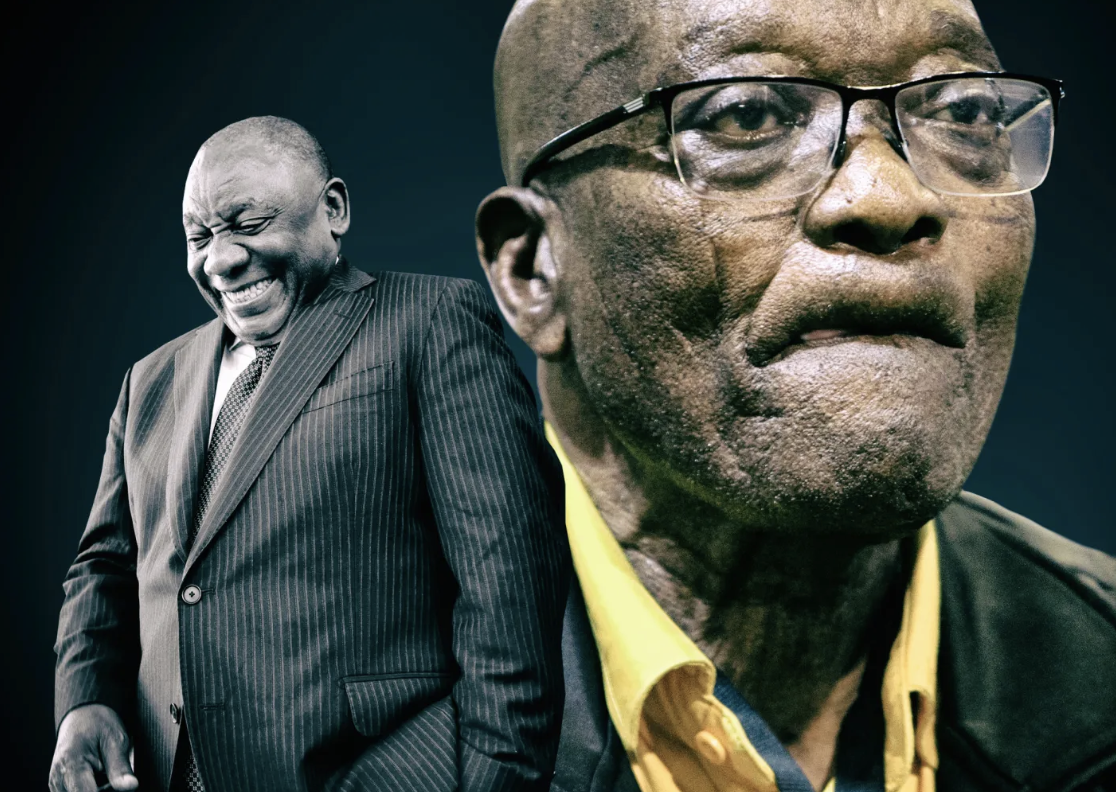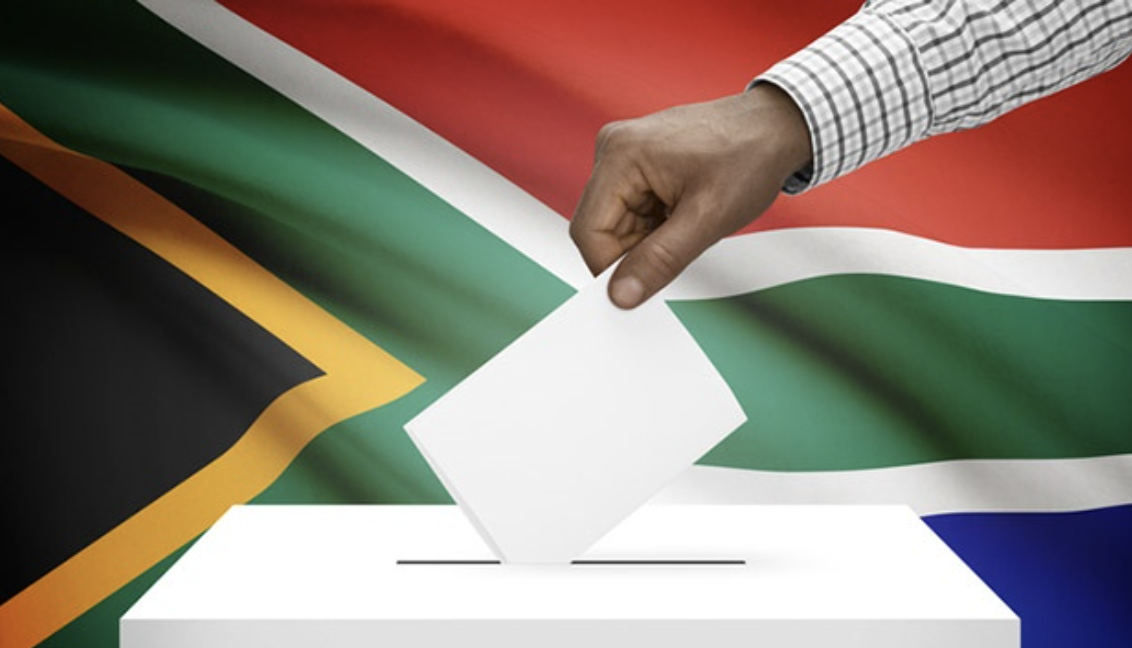News
Ramaphosa’s Failure to Deal with Corruption in the ANC May Come Back to Haunt Him
Jacob Zuma’s return to politics shakes up the country’s political dynamics and may lead to the fall of Cyril Ramaphosa while the ANC seeks ways to stay in power.

Director, The Brenthurst Foundation

Research Director, The Brenthurst Foundation

One of the fascinating insights from The Brenthurst Foundation’s election poll is how rapidly Jacob Zuma’s MK party is rising at the expense of the ANC, the EFF and the IFP.
The dynamic between the MK party and the EFF is clear.
The ANC’s radical economic transformation wing left the party along with Ace Magashule late last year, providing the EFF with a boost. Our October 2023 poll showed the EFF gaining 6%, to rise to 17%.
Now that Zuma has presented himself and the MK party as an alternative, this nomadic left has moved its sheep into his party.
Why go for the young imitator when you can have the real thing – the architect of State Capture himself? The EFF has declined 10% in our latest survey.
You would have thought that Cyril Ramaphosa’s ANC had shed all the Zuma ballast that it could, but this is not the case.
Our latest survey shows the ANC dropping by two percent, to 39%.
Closer scrutiny of the numbers shows that it has lost a swathe of its supporters to Zuma in KwaZulu-Natal, where MK is now the dominant party with 25%.
The DA, IFP and ANC are at 19%, 19% and 20% respectively in the province, making a coalition government inevitable.
Ramaphosa to blame
The blame for Zuma’s resurgence and the challenge it poses to the ANC must fall squarely on the shoulders of Ramaphosa, who has failed to deal with corruption in the party on any substantial scale.
That corruption (27% of respondents) and weak leadership (12%) rank in the top four problems facing the country (unemployment being top with 28%, and load shedding at 17%) hints at why the ANC is losing support.
The country is gatvol, with 80% saying it is going in the wrong direction, and most holding the ANC responsible.
It looked different seven years ago.
When Ramaphosa took power in 2018, he had all the cards. He had saved the party from a predicted electoral calamity following the State Capture revelations by successfully challenging Zuma’s faction and winning the presidency.
A wave of popular support – dubbed “Ramaphoria” – swept the country as the opportunity to clean house finally materialised.
Stage was set
With a majority in the party’s NEC, the stage was set for Ramaphosa to strike a devastating blow at the perpetrators of State Capture by throwing them out of the executive and restoring a powerful independent arm of the prosecution service to go after the scoundrels.
Instead, he dithered.
His first Cabinet, announced after an unseemly delay and televised live, was a bitter disappointment. Instead of cleaning house, Ramaphosa included several ministers implicated in State Capture.
Among them were some who were prominent in Zuma-era controversies such as Bathabile Dlamini, Nathi Mthethwa and Nomvula Mokonyane.
By placing party unity over dealing decisively with corruption, he took the air out of public excitement at the prospects of his presidency.
Prosecuting authority failure
He renewed the leadership of the prosecuting authority, appointing Shamila Batohi to replace the hapless Shaun “The Sheep” Abrahams, who was widely viewed as a member of the bar, Saxonwold Shebeen Branch.
Batohi was soon exposed for having the desire but not the means to take out corruption’s bigwigs.
Charges were brought against Zuma and Magashule, but both are free men and Zuma is even standing for election.
This failure of means was underscored by the resignation of Hermione Cronje from the position of head of the NPA’s Investigating Unit in December 2021 after serving 30 months.
Daily Maverick reported that she had simply been unable to marshal the resources needed to go after high-profile State Capture perpetrators.
Instead of rapidly passing legislation and providing the resources to remedy this problem, Ramaphosa has seemed strangely recalcitrant.
A charitable view is that he is being tardy. Less charitable is the suggestion that the party leadership post-Zuma still has too many dollars stuffed in too many couches to let loose a truly independent prosecuting authority.
In the minds of voters, unemployment and corruption are linked.
It is remarkable how every junior party apparatchik, however inexperienced and underqualified, can find a job in one of the tiers of government or at a state-owned enterprise.
Alternatively, they become what is described with uniquely dark South African humour as a “tenderpreneur”.
Tenderpreneurs start businesses that are good at one thing only – winning tenders. Delivering the goods at the right price is another matter.

Ordinary South Africans, some even with university degrees, struggle to find jobs. A full 71% of unemployed youth – using the broader definition which includes those who have given up trying to find work – are spectators as this flock of party sheep graze in the green pastures of government.
The ANC remains a formidable election machine and probably has access to more money than ever thanks to its geopolitical orbit of the likes of Russia and Iran – another polarising policy shift that is costing it votes.
South Africans have been patient with the ANC.
Thirty years of ANC rule
The party would claim, naturally, that it has not been in power long enough to right the wrongs of apartheid. But it has been in power three years longer than Kenneth Kaunda in Zambia (1964-91) and the same as Malawi’s Kamuzu Hastings Banda (1964-1994).
All credible accounts had Zanu-PF losing the 2008 election to Morgan Tsvangirai’s Movement for Democratic Change, 28 years after Robert Mugabe took over in the transition from Rhodesia to Zimbabwe.
South Africa is now 30 years into ANC rule and the signs are that it too has lost the support of the majority.
The failure to deal with Zuma has led to his political revival and a dramatic new dynamic in South African politics. It now seems certain there will be a coalition government following this year’s election.
The ANC will likely emerge bruised, but still the largest single party.
It may choose to partner with parties of the centre and make good on its promise to eliminate graft and return the country to a rational policy footing.
Or it may choose to open the door of its political tent to Zuma or Julius Malema – or both – and continue with its pivot towards the authoritarian world of Russia, China and Iran.
Zuma, the comeback king, will hold several tantalising cards.
According to our survey, his party will be the largest in KwaZulu-Natal, offering the ANC the chance to stay in power there through a provincial coalition.
And, in deadlocked Gauteng, he may emerge as a kingmaker along with Malema.
In such a scenario, there is no small irony in the likelihood that Zuma and Malema will insist on a price for keeping the ANC in power: Ramaphosa’s head.
This article originally appeared on the Daily Maverick
Photo: The Daily Maverick

